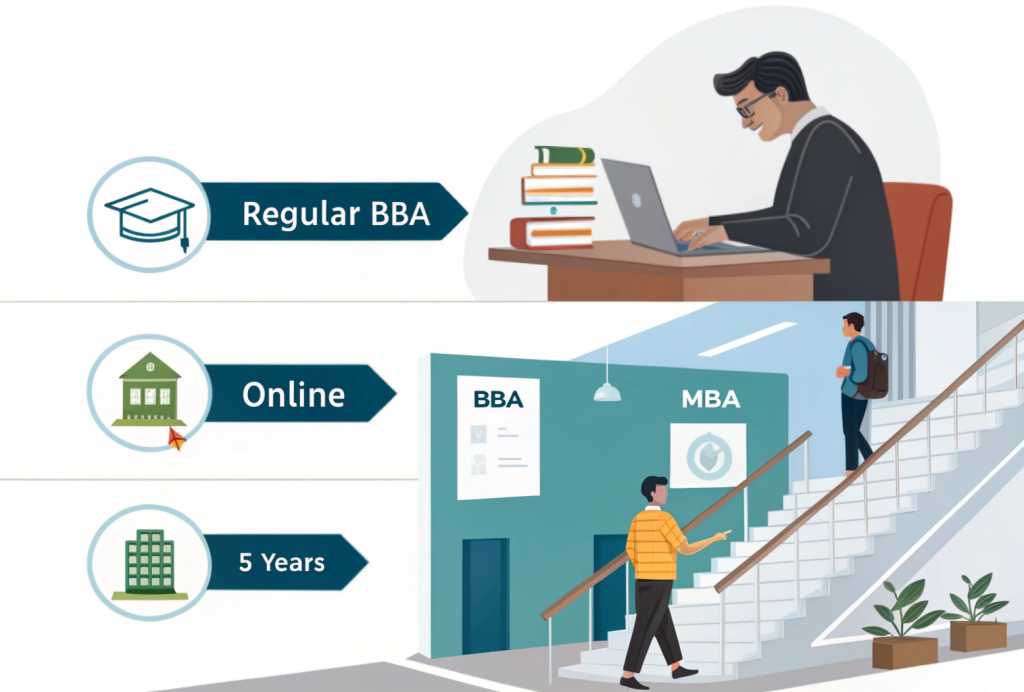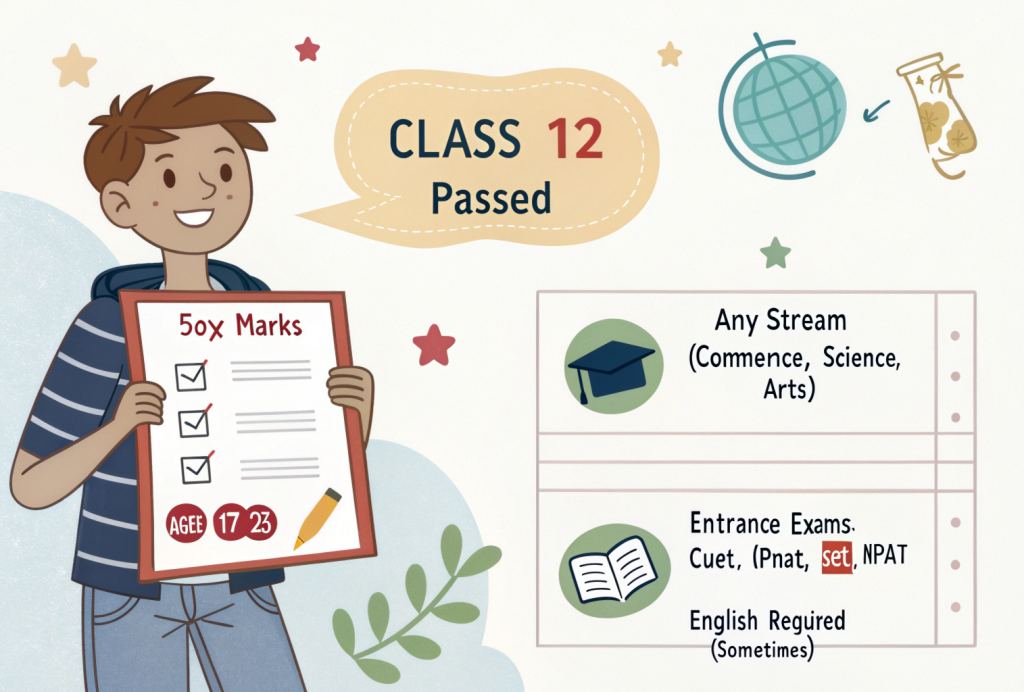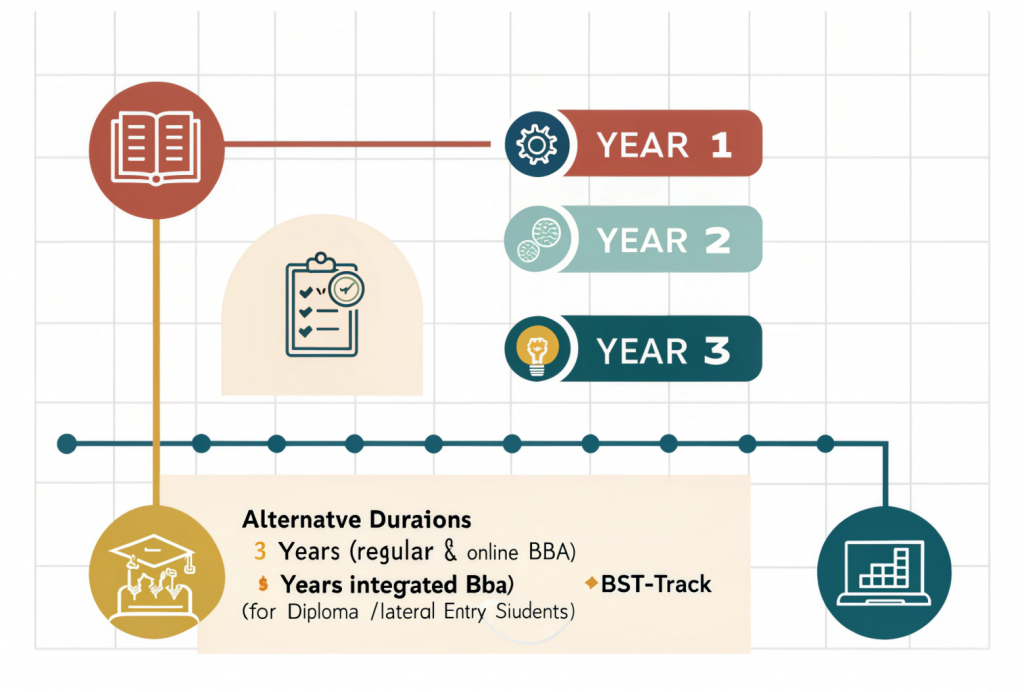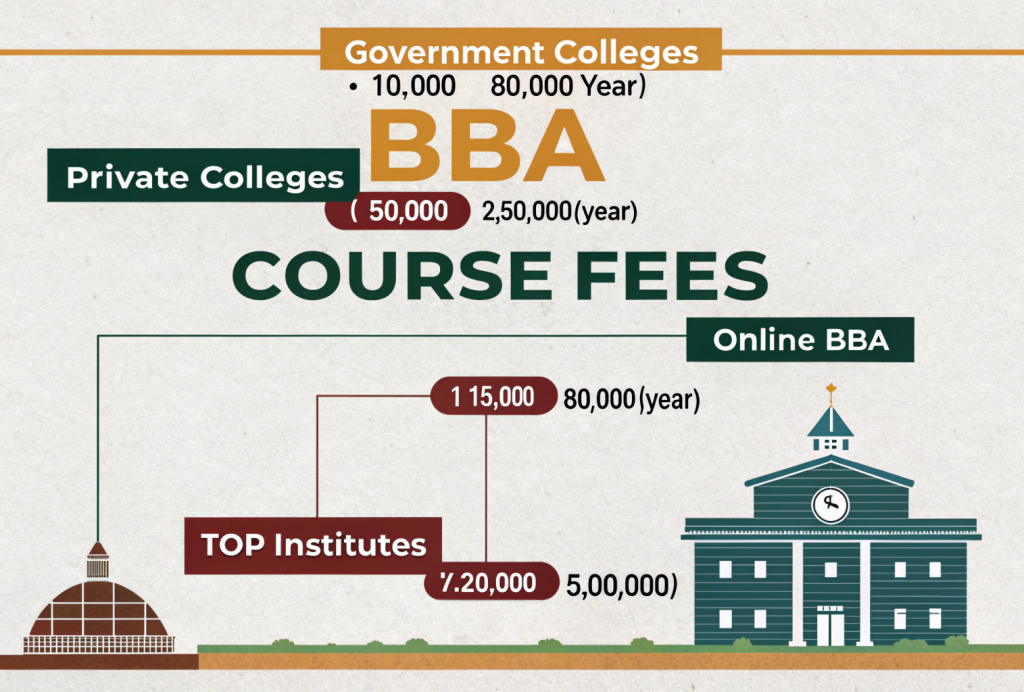The Bachelor of Business Administration (BBA) is one of the most popular undergraduate courses for students interested in business, management, or entrepreneurship. It provides a strong foundation in key business areas like marketing, finance, human resources, and operations. Whether you want to run your own startup, climb the corporate ladder, or pursue an MBA later, BBA opens up a wide range of opportunities. In this guide, we’ll walk you through everything you need to know about the BBA course—its full form, benefits, types, eligibility, fees, duration, subjects, specialisations, career paths, and top colleges in India—to help you decide if it’s the right choice for your future.
What Is BBA? – Full Form & Introduction

BBA Full Form: Bachelor of Business Administration
BBA is a 3-year undergraduate degree focused on developing business and management skills in students. It covers areas like marketing, finance, HR, operations, and entrepreneurship, making it a popular choice for students who want to build a career in the business world.
The course is designed to give students a strong foundation in business concepts while also improving communication, leadership, and decision-making skills. BBA is not just limited to theoretical knowledge—it often includes practical projects, internships, and case studies to help students understand real-world business scenarios.
It is open to students from any stream (Science, Commerce, Arts) who have completed their 12th standard. Whether you aim to become an entrepreneur, manager, or pursue an MBA later, BBA is a solid first step.
Why Choose BBA? – Key Benefits & Career Scope

BBA is a smart choice for students who want to build a strong foundation in business and management right after 12th grade. It offers a mix of theoretical knowledge and practical skills that are useful in the real business world. One of the biggest advantages of doing a BBA is that it opens the door to a wide range of career options across different industries like marketing, finance, HR, operations, and more.
The course also helps develop essential skills such as leadership, communication, problem-solving, and decision-making. These are in high demand by employers and are useful whether you plan to work for a company or start your own business. After completing a BBA, many students go on to pursue an MBA or other higher studies for even better job prospects.
Overall, BBA offers both academic and career flexibility, making it a great stepping stone for anyone aiming to grow in the field of business.
Types of BBA Programs in India (Regular, Online, Integrated)

BBA programs in India come in different formats to suit the needs of various learners. Whether you’re a full-time student, a working professional, or someone preparing for higher studies, there’s a version of BBA for you.
- Regular BBA
This is the most common format, offered by colleges and universities through on-campus classes. It follows a structured schedule with in-person lectures, seminars, group projects, and campus placements. Ideal for students who prefer face-to-face learning and a college experience. - Online BBA
Online BBA programs are conducted completely through digital platforms. These are flexible and perfect for working professionals, entrepreneurs, or students who cannot attend campus. Many UGC-approved universities now offer Online BBA degrees that are at par with regular ones. - Integrated BBA + MBA
An integrated BBA-MBA is a 5-year dual degree course that combines both undergraduate and postgraduate business education. You save one year by skipping the separate entrance process for MBA. It’s ideal for students who are sure about pursuing an MBA after graduation.
| Type | Duration | Ideal For | Mode |
|---|---|---|---|
| Regular BBA | 3 Years | Fresh 12th pass-outs | On-campus |
| Online BBA | 3 Years | Working professionals, remote learners | Online |
| Integrated BBA-MBA | 5 Years | Students aiming for MBA directly | On-campus / Hybrid |
BBA Eligibility Criteria (General Overview)

Getting into a BBA program is fairly simple compared to other professional courses. Most universities and colleges in India have similar basic eligibility criteria.
Basic Eligibility Requirements:
- Educational Qualification: You must have completed Class 12 (10+2) from a recognized board.
- Minimum Marks: Most colleges require at least 50% aggregate marks in Class 12. Some top colleges may ask for 60% or more.
- Stream Flexibility: Students from any stream—Commerce, Science, or Arts— can apply. However, Commerce students may find the subjects more familiar.
- Entrance Exams (if applicable): Some universities conduct entrance exams such as:
- CUET (Common University Entrance Test)
- IPMAT (for IIM Indore and Rohtak)
- SET (Symbiosis Entrance Test)
- NPAT (by NMIMS)
- CUET (Common University Entrance Test)
Other Considerations:
- Age Limit: Generally, the age limit is 17–25 years, though this may vary by institute.
- English Proficiency: Some institutions may require English as a compulsory subject in Class 12.
In summary, if you’ve completed your 12th with decent marks and basic communication skills, you’re eligible to pursue BBA from most universities.
Want to know if you qualify for a BBA? Check out our complete BBA eligibility guide for 2025.
BBA Course Duration

The duration of a BBA program is typically 3 years, divided into 6 semesters (two per year). Each semester includes a mix of core subjects, electives, and practical assignments or projects.
Here’s a breakdown of the timeline:
- Year 1: Introduction to management concepts, business communication, basics of economics and accounting.
- Year 2: Deeper understanding of functional areas like marketing, finance, HR, and operations.
- Year 3: Advanced subjects, specialization options (if offered), and project work or internships.
Variations Based on Format:
- Regular & Online BBA: Usually 3 years.
- Integrated BBA + MBA: 5 years (combined UG + PG).
- Fast-track Options: Some universities offer accelerated versions for diploma holders or lateral entry students, which can be shorter.
The structure allows enough time for students to grasp business fundamentals and gain industry exposure before stepping into the job market or higher education.
Discover the complete BBA course duration and semester-wise timeline in our detailed guide.
BBA Fees Overview (Range & Factors)

The cost of pursuing a BBA degree in India can vary a lot depending on the type of college and mode of learning. Here’s a simple breakdown:
General Fee Range:
- Government/Public Universities: ₹10,000 to ₹80,000 per year
- Private Colleges: ₹50,000 to ₹2,50,000 per year
- Online BBA Programs: ₹15,000 to ₹80,000 per year (flexible and affordable)
- Top Institutes (e.g., NMIMS, Christ, Symbiosis): ₹2,00,000 to ₹5,00,000 total
Key Factors Affecting BBA Fees:
- Type of Institution: Private colleges generally charge more than government universities.
- Location: Colleges in metro cities like Delhi, Mumbai, and Bangalore usually have higher tuition and living costs.
- Mode of Study: Online and distance learning programs are more budget-friendly.
- Facilities & Placements: Colleges offering modern infrastructure, internships, and placement support tend to charge higher fees.
- Specialisation: Some niche or industry-linked BBA specialisations may have slightly higher fees due to added resources or faculty.
Other Costs to Consider:
- Registration & exam fees
- Books and study materials
- Hostel and living expenses (if applicable)
In short, BBA can be affordable or premium—depending on where and how you choose to study.
For a detailed breakdown of BBA course fees—including government vs private, online vs campus, scholarships, and loan options—check out our dedicated article: What Is BBA Course Fees Structure in India?
Explore our online programs to become future-ready
Transform your career with industry-aligned courses designed by experts.
View All CoursesBBA Syllabus Overview
While the exact subjects can vary by college, the BBA syllabus generally covers all major aspects of business and management. Here’s a simple overview of the main areas you will study:
Core Subjects:
- Principles of Management
- Business Economics
- Financial Accounting
- Marketing Management
- Human Resource Management
- Business Law
- Organizational Behaviour
Skill-Based & Applied Subjects:
- Business Communication
- Business Mathematics & Statistics
- Computer Applications in Business
- Entrepreneurship Development
Specialisation Subjects (in later semesters):
Depending on your chosen specialisation (e.g., Marketing, Finance, HR), you will study advanced subjects in that area.
Projects & Internships:
Most BBA programs include summer internships and final-year projects to help you apply your learning in real-world situations.
General Pattern:
- Year 1: Introduction to management, economics, and communication
- Year 2: Deeper understanding of functional areas (marketing, HR, finance)
- Year 3: Specialisations, electives, and project work
This structure ensures you build a solid foundation while also gaining practical business skills.
For a detailed semester-wise breakdown of BBA subjects, core courses, electives, internships, and practical tips, explore our Complete BBA Syllabus 2025 guide.
Read More : Detailed guide on How Many Subjects Are There in a BBA Course in 2025.
Top Specialisations in BBA
As you progress through your BBA, many colleges offer the option to choose a specialisation based on your interests and career goals. These help you focus on a specific area of business and gain deeper knowledge.
Here are some of the most popular BBA specialisations:
- Marketing
Focuses on consumer behavior, branding, digital marketing, and market research. Great for those interested in sales, advertising, and brand management.
Discover how a BBA in Digital Marketing combined with hands-on tools like SEO, social media, analytics, and content strategy makes you career-ready in the digital age.
- Finance
Covers financial planning, investment analysis, banking, and corporate finance. Suitable for students aiming for careers in banking, accounting, or stock markets. - Human Resource Management (HRM)
Deals with employee management, recruitment, training, and labor laws. Ideal for those interested in managing people and organizational culture. - International Business
Teaches how businesses operate globally—import/export, foreign trade laws, and global marketing strategies. - Business Analytics
Combines business knowledge with data analysis skills. Perfect for students interested in data-driven decision-making and analytics roles. - Operations & Supply Chain Management
Focuses on the backend of businesses—production, logistics, inventory, and quality management. - Entrepreneurship
For students planning to start their own venture. Covers startup management, business planning, and innovation strategies. - Hospitality or Tourism Management
Offered by some universities, this specialisation is ideal for careers in hotels, travel, and event management.
Each specialisation opens up specific career paths and can give you an edge in the job market or further studies.
Career Opportunities After BBA
One of the biggest strengths of a BBA degree is that it opens doors to a wide range of career paths right after graduation. You can either start working immediately or go for higher studies like an MBA.
Popular Job Roles After BBA:
- Marketing Executive: Manage branding, promotions, and customer outreach.
- Sales Executive: Handle client relationships and sales targets.
- HR Executive: Assist in hiring, training, and employee engagement.
- Financial Analyst: Analyze budgets, investments, and company finances.
- Business Development Executive: Identify growth opportunities and partnerships.
- Operations Executive: Support the smooth functioning of internal processes.
Sectors That Hire BBA Graduates:
- Corporate firms (across industries)
- Startups
- Banks and financial institutions
- Consulting firms
- E-commerce companies
- FMCG and retail brands
Further Study Options:
- MBA or PGDM: Most BBA graduates go for an MBA to gain in-depth expertise and improve their career prospects.
- Other PG Courses: MIM, MS in Business Analytics, or professional certifications like CFA, CPA, or Digital Marketing.
Entrepreneurship:
If you have a business idea, BBA gives you the foundation to launch your own startup, with knowledge of business planning, finance, and marketing.
In short, BBA is a launchpad—you can step into a job, explore your own venture, or build on it with higher studies.
Want a detailed breakdown of top roles, sectors, and salaries? Check out our full guide on Job Opportunities After BBA.
Conclusion
BBA is a smart choice for students who want to build a career in business, management, or entrepreneurship. It’s not just for commerce students—even those from arts or science backgrounds can benefit if they’re curious about how businesses work.
You should consider BBA if:
- You enjoy subjects like business studies, economics, or marketing.
- You want to enter the corporate world early and grow with experience.
- You’re planning to do an MBA later and want a strong foundation.
- You have leadership qualities or want to run your own business someday.
- You’re interested in practical learning through projects, presentations, and internships.
In short, BBA is ideal for anyone looking to combine theory with hands-on experience in the world of business. It’s flexible, career-oriented, and full of long-term growth potential.


Leave a Reply